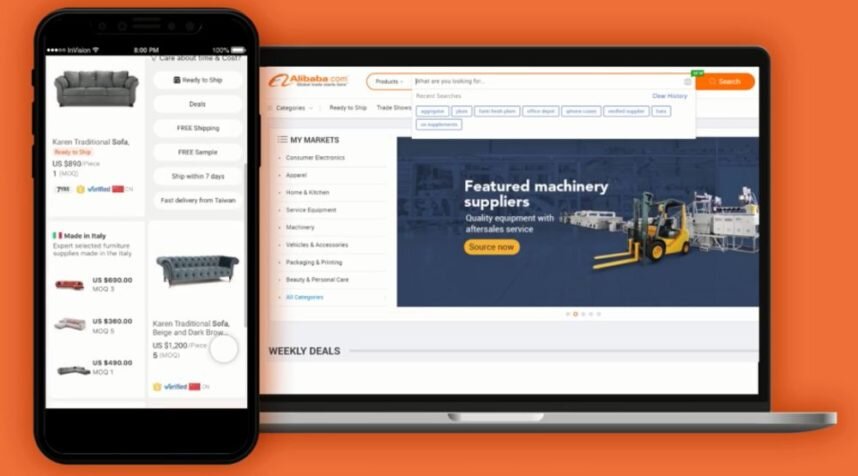Alibaba.com Uses Workshops to Educate Third-Party B2B Sellers
The following article was published by Furniture Today and can be found here.
Company targets home furnishings vendors
Alibaba.com said its Build Up workshops being held across the U.S. have been successful in drawing small- and medium-sized businesses to the platform, and the e-commerce company is looking to add more home furnishings companies to that mix.
<img src="https://images.squarespace-cdn.com/content/v1/58876534f5e2318d733373d9/1576617333748-L7Y7NSHBGIMNMZS7FYZS/ke17ZwdGBToddI8pDm48kNnkM9WY1mlEMHX754VOuZpZw-zPPgdn4jUwVcJE1ZvWQUxwkmyExglNqGp0IvTJZamWLI2zvYWH8K3-s_4yszcp2ryTI0HqTOaaUohrI8PI31Ce-mTpsz3JFhlS-yUohlGYB5z6WJlusOtQBwiGDOYKMshLAGzx4R3EDFOm1kBS/Alibaba-platform-crop-e-e1575407739758.jpg" alt="Photo courtesy of Furniture Today" />

Photo courtesy of Furniture Today
“We are currently recruiting sellers where we think there is global demand in areas such as furniture, as well as home and garden,” said Erica Chan, head of brand and marketing for Alibaba.com in North America.
“After each of the workshops, we add to our database of knowledge about our customers and what their challenges and pain points are,” she said. “There is a lot of misconception about what Alibaba.com does, and we want to make sure companies know we are strictly a B2B platform.”
Chan said although Alibaba.com and AliExpress.com are both online marketplaces operated under the Alibaba Group umbrella, the main difference is that Alibaba.com is exclusively intended for B2B transactions, whereas AliExpress.com is open to consumers. The goal for Alibaba.com is to help businesses purchase products directly from manufacturers at wholesale prices. It’s currently the largest online supplier directory where a business can order directly from a manufacturer, according to Chan.
The Alibaba.com platform is designed to help sellers and buyers communicate directly. “Historically, that is how B2B has been done, at trade shows and in sales offices,” she said. “So, we want to take those experiences online to help reduce the barriers of distance, language and time. We believe that B2B is a human business that relies on personal contact to build trust.”
When it comes to home furnishings companies, that personal communication can offer a distinct advantage over simply adding a product to a cart online. And that’s how Josh Walter, CEO and co-founder of e-commerce and marketing company BrandJump, presents it to his home decor clients.
“Home furnishings products in many cases have both design and functional elements to them,” said Walter. “Traditionally, manufacturers have relied upon a trained salesperson to share information about the product. This typical sales process can be replicated on Alibaba.com, which is very helpful since being able to share product knowledge through direct communication offers a big advantage.”
Walter says many of his clients are looking at opportunities with Alibaba.com since there aren’t currently many home furnishings brands on the site.
“One of the ways to grow in a saturated market is to embrace new opportunities such as e-commerce,” Walter said. “This can extend business even further within the B2B arena by allowing them to target specific communities such as designers, contractors and architects, as well as the contract and hospitality industries.”
Walter said for his customers the percentage of sales coming from selling to the trade and internationally is growing month over month. “Some home furnishings don’t translate to other parts of the world since there are lighting and bedding differences,” he said. “But there are categories within the dining room, living room and accent décor that can be sold internationally to boost overall sales volume.”
Chan said that, before partnering with Alibaba.com, companies should consider that they will have to control what their brand looks like since they design their own storefronts. “Our goal is to create a venue where buyers and sellers can meet,” she said. “Alibaba.com itself doesn’t sell anything.”
Companies pay an annual membership fee and an initial set up fee to operate on the platform. Memberships can be purchased according to different levels. Alibaba.com does provide technical support and assistance with uploading products to the store.
“It’s not as simple as setting up a storefront and letting it go,” Chan said. “It’s important in the B2B environment that sellers actively manage the inquiries. That is where our Build Up workshops have been helpful in educating potential partners.”
